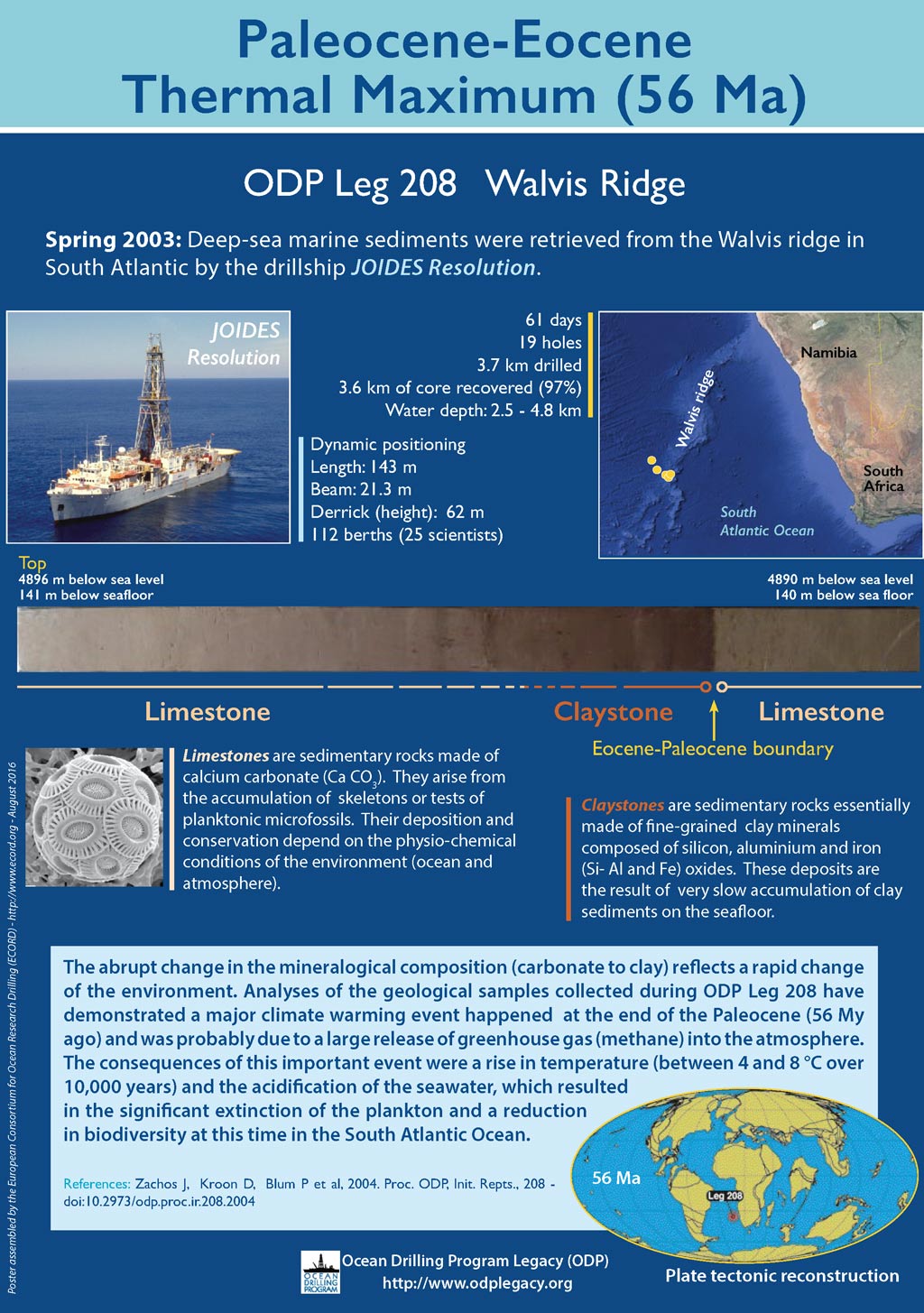Paleocene-Eocene Thermal Maximum (56 Ma)
Replica of core section: ODP Leg 208, Hole 1262C – Core 5H, Section 4
Expedition: Leg 208 Cenozoic Climate Cycles: Walvis Ridge Transect
Replica of a core drilled in the early Cenozoic sediments of the Walvis Ridge, Southern Atlantic Ocean, showing the Paleocene/Eocene Thermal Maximum (PETM), ODP Leg 208, Hole 1262C – Core 5H, Section 4.

Deep-sea marine sediments: limestones and claystone
This core section illustrates a major climate warming event that happened at the end of the Paleocene (56 My ago). The consequences of this important event were a rise in temperature (between 4 and 8 °C over
10,000 years) and the acidification of the seawater, which resulted in the significant extinction of the plankton and a reduction in biodiversity at this time in the South Atlantic Ocean.
Limestones are sedimentary rocks made of calcium carbonate (Ca CO3). They arise from the accumulation of skeletons or tests of planktonic microfossils. Their deposition and conservation depend on the physio-chemical conditions of the environment (ocean and atmosphere).
Claystones are sedimentary rocks essentially made of fine-grained clay minerals composed of silicon, aluminium and iron (Si- Al and Fe) oxides. These deposits are the result of very slow accumulation of clay sediments on the seafloor.
Downloads
Core Photo: ODP Leg 208 Hole 1262C Core 5H Section 4
(JPG)
Search for other photos from ODP expeditions »
(Janus database Core Photo query)
PETM core replica flyer - English »
(English, PDF)
PETM core replica flyer - French »
(French, PDF)
Read more
Zachos, J., Kroon, D., Blum, P. et al, 2004. Proc. ODP, Initial Reports., 208 – doi:10.2973/odp.proc.ir.208.2004, http://www-odp.tamu.edu/publications/208_IR/208TOC.HTM
Leg related citation: http://www-odp.tamu.edu/publications/citations/cite208.html
Request to loan an ECORD core replica
Core replicas are loaned free of charge for a time-limited period to scientists, museums, universities and research institutions based in ECORD member countries.
In order to loan the core replica please contact info@ecord.org
About expedition
ODP Leg 208 Cenozoic Climate Cycles: Walvis Ridge Transect
Drillship: JOIDES Resolution (JR)
TDuring Ocean Drilling Program Leg 208, six sites were drilled at water depths between 2500 and 4770 m to recover Cenozoic sediments on the northeastern flank of Walvis Ridge. Previous drilling in this region (Deep Sea Drilling Project [DSDP] Leg 74) recovered pelagic oozes and chalk spanning the Cretaceous/Paleogene (K/Pg), Paleocene/Eocene, and Eocene/Oligocene boundaries. The composite sections, recovered via double and triple coring, provide a detailed history of paleoceanographic variation associated with several prominent episodes of early Cenozoic climate change, including the K/Pg boundary, Paleocene/Eocene Thermal Maximum (PETM), early Eocene Climatic Optimum, and early Oligocene Glacial Maximum. The PETM interval, the main target of Leg 208, was recovered at five sites along a depth transect of 2.2 km. A prominent red clay layer marks the boundary sequence at all
sites. Additionally, two as-yet undocumented early Eocene hyperthermal events were recovered: Elmo and X, dated at ~53.5 and ~52 Ma, respectively.






